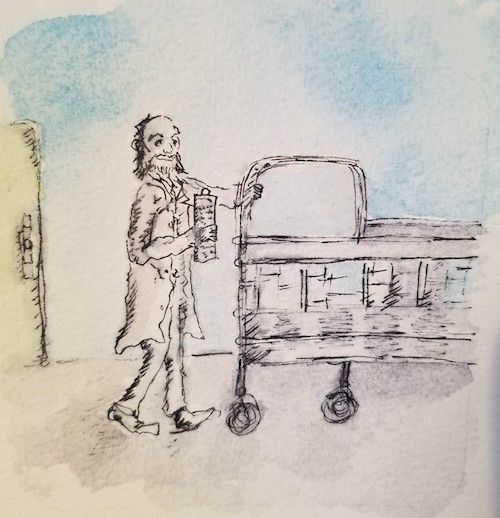WE ARE INTRODUCED to Wellington Yueh, as we are to many doctors, in the glow of his credentials. He wears a diamond on his forehead and a ring in his hair, both symbols of his training at the venerable Suk Medical School. In the Dune universe, the school is known for psychologically conditioning its graduates into a posture of non-maleficence, that timeworn imperative to first do no harm. Amid the high stakes of Imperial politics, where Great Houses find cause to employ spies and assassins alongside their private physicians, a Suk doctor’s value rests far more on ironclad ethics than any particular clinical expertise.
Yet Yueh’s primary role in the story is as an agent of harm. Granted, there’s an element of compulsion to it — he’s led to betray House Atreides by its sworn enemies, the Harkonnens, who pull the necessary psychological strings by convincing Yueh that his wife’s life hangs in the balance. Through his secondary actions, though — providing an escape route for Duke Leto’s partner Jessica and son Paul, and arming the duke with a prosthetic tooth that doubles as a kamikaze weapon — the doctor suggests that he may not have lost his moral compass so much as awakened to a larger moral calculus. Betraying a patient to save your own wife is one thing, but what about betraying a patient to save his family? Or to kill a monster? Or to prevent a war?
One assumes that the Suk Medical School offers at least some upper-level coursework on handling these inevitable trolley-style problems. Then again, maybe a radically simplified professional credo renders such questions moot. When I was a medical student, I don’t recall my ethics education being especially robust, despite bearing regular witness to cardiopulmonary floggings at the end of life, or hospital discharges of uninsured people with a sheaf of unfillable prescriptions. Biomedicine affords its practitioners the privilege of compartmentalization, detaching the body from its external circumstances and repairing it in a vacuum. With an attendant dream of total precision, this approach lends credence to an ethical framework in which healers might absolve themselves entirely from the prospect of collateral damage.
In Inescapable Ecologies (2007), historian Linda Nash contrasts this mechanical understanding with a much more longstanding vision of the body, which she terms “ecological.” This vision accords with ancient Greek ideas of health arising from compatibility between an individual’s temperament and the surrounding soil, or the idea persisting through the late 19th century that malaria arose after passing through “bad air.” It also accords with some contemporary models of chronic illness, of the sort studied by historian Michelle Murphy in Sick Building Syndrome and the Problem of Uncertainty (2006), which again locate disease just outside the body, at its interface with the environment. We get an early whiff of it, too, in Villeneuve’s Dune, when Yueh lays a diagnostic hand on Paul, disoriented after his first exposure to the spice-laden desert, and says with some surprise, “you seem to be sensitive.”
Nash and Murphy don’t necessarily dwell on the bioethical implications of ecological bodies, but in the face of so much intrinsic complexity, it’s hard to imagine clinicians sustaining the necessary hubris to support an ideal of perfect non-maleficence. The notion can feel as flimsy as the Fremkits that Paul and his mother find stowed in their escape vehicle. Packaged with a handwritten note from Yueh, they seem insufficient in the face of the sandstorm — at first. The kits are one more effort at harm reduction from the renegade doctor, a second skin that may or may not protect his former patients from hostile new surroundings. Subtle processes of physical change are already in motion, though, turning the surviving members of the Atreides family into blue-eyed sand-walkers. This transfiguration is wrought by the elements, and it also bears Yueh’s signature.
In a 1969 interview, Frank Herbert made his interest in certain tensions explicit. With reference to the novel’s planetary ecologist, for example, the fact that he “sees all of these things happening to him as mechanical things doesn’t subtract from the fact that he is still a part of this system, because it is observing him.” Later, he characterizes Paul’s journey in Dune as “an exercise in showing up, you might say, the fallacy of absolutism.” Yueh embodies similar tensions — between the rigidity of professional duty and the contingency of private motives; between the order of the royal residence and the volatile landscape into which it ruptures; between the infinitely legible bodies of the future and the wildly fluid bodies of the past.
¤
Art by Kenneth Mills.
¤
LARB Contributor
Nitin K. Ahuja is an assistant professor in the Division of Gastroenterology and Hepatology at the University of Pennsylvania. His writing has appeared in The Yale Review, The Washington Post, Aeon, Slate, The New England Journal of Medicine, and elsewhere.
LARB Staff Recommendations
Sietchposting: A Short Guide to Recent Work on “Dune”
The “dunescourse” — or “sietchposting,” as it is affectionately called — is vast.
Eugenics
How the history of eugenics informs "Dune."
Did you know LARB is a reader-supported nonprofit?
LARB publishes daily without a paywall as part of our mission to make rigorous, incisive, and engaging writing on every aspect of literature, culture, and the arts freely accessible to the public. Help us continue this work with your tax-deductible donation today!
